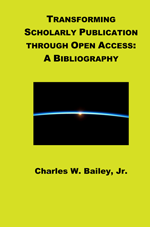The Public Knowledge Project has released the Open Monograph Press, Release 1.0.
Here's an excerpt from the announcement:
OMP is designed to assist university presses, learned societies, and scholar-publishers interested in publishing scholarly books in print-on-demand and multiple electronic formats, whether on an open access or purchase basis. OMP is intended to:
- Handle edited volumes, with different authors for each chapter;
- Involve editors, authors, reviewers, designers, indexers, and others in book production;
- See submission through multiple rounds of both internal and external reviews;
- Utilize industry standard ONIX for bookseller metadata requirements (e.g., Amazon);
- Create document libraries for submissions, recording contracts, permissions, etc.;
- Handle thumbnail covers in Catalog, as well as Spotlight features; and
- Enable Series Editors to see books through review to publication.
| Digital Scholarship | Digital Scholarship Publications Overview | Sitemap |

